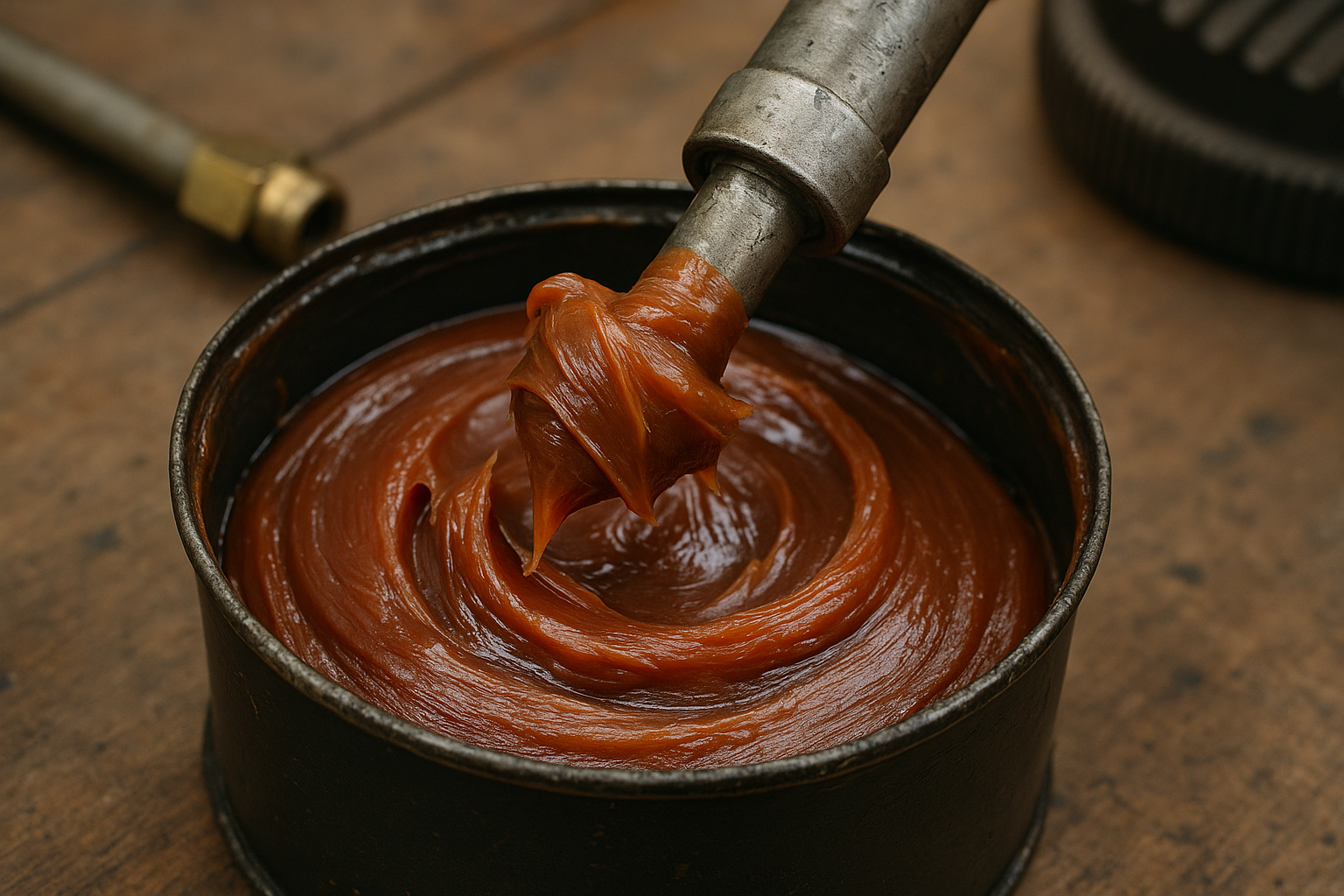Have you ever wondered why some industrial machinery continues to operate smoothly even under extreme temperatures that would cause conventional lubricants to fail? The answer often lies in a remarkable substance called bentonite grease a specialised lubricant that has revolutionised high-temperature industrial applications across India and globally.
Bentonite grease represents a significant advancement in industrial lubrication technology, offering unique properties that make it indispensable in numerous sectors. From steel mills operating at scorching temperatures to heavy machinery in mining operations, this clay-based lubricant has proven its worth time and again.
Understanding Bentonite Grease: The Basics
Bentonite grease is an inorganic, clay-based lubricant formulated using bentonite clay as its primary thickening agent. Unlike conventional soap-based greases, bentonite grease possesses exceptional thermal stability and unique non-melting characteristics that make it ideal for extreme operating conditions.
The foundation of bentonite grease lies in bentonite clay, a naturally occurring mineral with remarkable properties. Companies like CMS Industries, an ISO 9001:2015 certified manufacturer based in Gujarat, have been at the forefront of producing high-quality bentonite that serves as the raw material for various industrial applications, including specialised lubricants.
Key Properties of Bentonite Grease
The distinctive characteristics of bentonite grease set it apart from traditional lubricants:
Temperature Resistance: One of the most remarkable features of bentonite grease is its ability to maintain consistency across wide temperature ranges. While conventional greases typically fail at high temperatures, bentonite grease remains stable and effective.
Non-Melting Nature: Unlike soap-thickened greases that have a specific dropping point, bentonite grease doesn’t melt. This property ensures continuous lubrication even under extreme heat conditions.
Water Resistance: The clay-based formulation provides excellent water tolerance, making it suitable for applications in humid or wet environments.
Mechanical Stability: Bentonite grease exhibits superior shear stability, maintaining its protective properties even under heavy mechanical stress.
Industrial Applications of Bentonite Grease
The versatility of bentonite grease has made it essential across numerous industries in India and worldwide. Its unique properties address specific lubrication challenges that conventional greases cannot handle effectively.
High-Temperature Manufacturing
In steel mills and foundries, where temperatures can exceed 200°C, bentonite grease provides reliable lubrication for:
- Rolling mill bearings
- Conveyor systems
- Furnace door mechanisms
- Heat treatment equipment
The non-melting characteristic ensures that lubrication remains effective even when exposed to radiant heat from furnaces and molten metal processes.
Heavy-Duty Mining Operations
Mining equipment operates under extreme conditions, combining high loads, dust, and temperature variations. Bentonite grease applications in mining include:
- Dragline swing bearings
- Conveyor belt systems
- Crusher mechanisms
- Underground mining machinery
The superior load-carrying capacity and resistance to contamination make bentonite grease particularly valuable in these demanding environments.
Automotive and Transportation
The automotive industry relies on bentonite grease for specific applications where conventional lubricants prove inadequate:
- Wheel bearings in heavy commercial vehicles
- Brake backing plate lubrication
- Chassis components exposed to high temperatures
- Industrial vehicle applications
Marine and Offshore Applications
The marine environment presents unique challenges, including saltwater exposure and temperature fluctuations. Bentonite grease serves effectively in:
- Ship bearing lubrication
- Offshore drilling equipment
- Marine winch systems
- Port handling machinery
Specialised Manufacturing Processes
Various manufacturing sectors benefit from bentonite grease’s unique properties:
Plastic Injection Moulding: The high-temperature stability makes it ideal for lubricating moulds and machinery components exposed to heat during the injection process.
Textile Industry: Spinning and weaving machinery operating continuously benefit from the long-lasting lubrication properties of bentonite grease.
Paper Mills: The water resistance and high-temperature stability make it suitable for paper manufacturing equipment.
Enhanced Formulations and Additives
Modern bentonite grease formulations often include specialised additives to enhance performance for specific applications:
Molybdenum Disulphide (MoS₂) Enhanced Grease
The addition of molybdenum disulphide creates a superior lubricant for extreme pressure conditions. This enhanced formulation provides:
- Exceptional load-carrying capacity
- Reduced friction in boundary lubrication conditions
- Extended equipment life in heavy-duty applications
Graphite-Enhanced Formulations
Graphite additives improve the lubricating properties, particularly for:
- High-load bearing applications
- Slow-speed, heavy-duty operations
- Equipment subject to shock loads
PTFE and Boron Nitride Additives
These advanced additives enhance the performance characteristics for specialised applications requiring:
- Ultra-low friction coefficients
- Chemical resistance
- Extended service intervals
Curious about whether Bentonite Clay Toothpaste is Safe with Mercury Fillings? Don’t miss this blog it covers everything you need to know!
Advantages Over Conventional Greases
The superior performance of bentonite grease compared to traditional soap-based lubricants stems from several key advantages:
Temperature Stability
While conventional greases typically fail at temperatures above 150°C, bentonite grease maintains its lubricating properties at much higher temperatures. This stability reduces maintenance requirements and equipment downtime.
Extended Service Life
The non-melting characteristic means that bentonite grease doesn’t leak out of bearings and components as readily as conventional greases, extending lubrication intervals and reducing maintenance costs.
Contamination Resistance
The clay-based thickener provides better resistance to contamination from dust, dirt, and moisture, maintaining lubricating effectiveness in harsh environments.
Chemical Compatibility
Bentonite grease demonstrates excellent compatibility with various sealing materials and doesn’t cause degradation of rubber and plastic components.
Application Guidelines and Best Practices
Proper application of bentonite grease ensures optimal performance and equipment protection:
Selection Criteria
When selecting bentonite grease for specific applications, consider:
- Operating temperature range
- Load characteristics
- Speed requirements
- Environmental conditions
- Compatibility with existing lubricants
Application Techniques
Effective application requires attention to:
- Proper cleaning of surfaces before application
- Correct quantity application to avoid over-greasing
- Compatibility checks with existing lubricants
- Regular monitoring and reapplication schedules
Storage and Handling
Proper storage ensures product integrity:
- Store in cool, dry conditions
- Protect from contamination
- Follow manufacturer’s storage guidelines
- Use proper dispensing equipment
Quality Considerations and Standards
The effectiveness of bentonite grease depends significantly on the quality of raw materials and manufacturing processes. Quality bentonite, such as that produced by established manufacturers like CMS Industries, ensures consistent performance and reliability.
Manufacturing Standards
Reputable manufacturers adhere to strict quality control measures:
- ISO certification compliance
- Regular testing of raw materials
- Consistent production processes
- Quality assurance at every stage
Performance Testing
Quality bentonite grease undergoes rigorous testing to ensure:
- Temperature stability
- Load-carrying capacity
- Mechanical stability
- Contamination resistance
Future Trends and Innovations
The development of bentonite grease continues to evolve with advancing technology and changing industrial requirements:
Nano-Technology Integration
Research into nano-additives promises enhanced performance characteristics including:
- Improved wear protection
- Extended service life
- Better thermal conductivity
- Enhanced contamination resistance
Environmental Considerations
Growing environmental awareness drives development of:
- Biodegradable formulations
- Reduced environmental impact
- Sustainable raw material sourcing
- Improved disposal methods
Smart Lubrication Systems
Integration with IoT and monitoring systems enables:
- Real-time performance monitoring
- Predictive maintenance scheduling
- Automated reapplication systems
- Data-driven optimisation
Conclusion
Bentonite grease has established itself as an indispensable component in modern industrial operations, offering unmatched performance in high-temperature and heavy-duty applications. Its unique properties including non-melting characteristics, exceptional temperature stability, and superior load-carrying capacity make it the preferred choice for industries ranging from steel manufacturing to mining operations.
The continued development of enhanced formulations with specialised additives ensures that CMS Industries’ bentonite grease remains at the forefront of industrial lubrication technology. As manufacturing processes become more demanding and operating conditions more extreme, the importance of reliable, high-performance lubricants like CMS Industries’ bentonite grease will only continue to grow.
For industries seeking reliable lubrication solutions for extreme conditions, partnering with established manufacturers who understand the critical importance of quality raw materials and precise formulation is essential. The investment in quality bentonite grease pays dividends through reduced maintenance costs, extended equipment life, and improved operational efficiency.
Frequently Asked Questions
Q: What makes bentonite grease different from regular grease?
Bentonite grease uses clay as a thickener instead of soap, providing superior high-temperature stability and non-melting properties that conventional greases cannot match.
Q: At what temperature range can bentonite grease be used effectively?
Bentonite grease typically performs well from -20°C to over 200°C, making it ideal for extreme temperature applications where conventional greases fail.
Q: Is bentonite grease suitable for food-grade applications?
Standard bentonite grease is not food-grade certified. Special food-grade formulations using approved additives are available for food processing equipment applications.
Q: How often should bentonite grease be reapplied in industrial equipment?
Reapplication frequency depends on operating conditions, but bentonite grease typically requires less frequent reapplication than conventional greases due to its non-melting properties.
Q: Can bentonite grease be mixed with other types of grease?
Mixing different grease types is generally not recommended as it can compromise performance. Always consult manufacturer guidelines before mixing lubricants.







